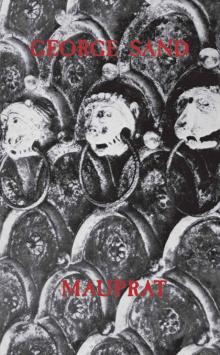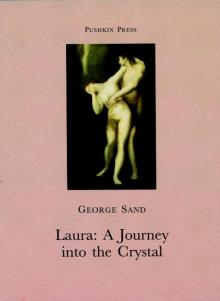- Home
- George Sand
Consuelo Page 5
Consuelo Read online
Page 5
"Your confidence inclines me to believe you. You say I heard her long since? I cannot remember when?"
"In the church of the Mendicanti, on a general rehearsal of the 'Salve Regina' of Pergolese."
"Oh, I remember now," exclaimed the count; "voice, accent, and intelligence equally admirable!"
"She was then but fourteen, my Lord—no better than a child."
"Yes—but now I think of it, I remember she was not handsome."
"Not handsome, Eccellenza!" exclaimed Anzoleto, quite astounded.
"She was called—let me see—was it not a Spanish name—something out of the way?"
"It was Consuelo, my Lord."
"Yes, that is the name; you were to marry her then, a step which made the professor and myself laugh a little. Consuelo—yes, it is the same; the favorite of the professor, an intelligent girl, but very ugly."
"Very ugly?" repeated Anzoleto, as if stupified.
"Yes, my child. Do you still admire her?"
"She is my friend, Illustrissimo."
"Friend! that is to say sister or sweetheart—which of the two?"
"Sister, my master."
"In that case I can give you an answer without paining you; your idea is devoid of common sense. To replace Corilla it would require an angel of beauty, and your Consuelo, if I remember rightly, was not only ugly, but frightful!"
The count was accosted at this moment by one of his friends, and left Anzoleto, who was struck dumb with amazement, and who repeated with a sigh, "She is frightful!"
CHAPTER VII
IT may appear rather astonishing, dear reader, and yet it is very certain, that Anzoleto never had formed an opinion of the beauty or the ugliness of Consuelo. Consuelo was a being so solitary, so unknown in Venice, that no one had thought of seeking whether, beneath this veil of isolation and obscurity, intelligence and goodness had ended by showing themselves under an agreeable or insignificant form. Porpora, who had no senses but for his art, had only seen in her the artist. Her neighbors of the Corte Minelli observed, without attaching any blame to it, her innocent love for Anzoleto. At Venice they are not particular on this score. They predicted indeed very often, that she would be unhappy with this youth without business or calling, and they counseled her rather to seek to establish herself with some honest workman. But she replied to them that, as she herself was without friends or support, Anzoleto suited her perfectly, and as for six years no day had passed without their seeing them together, never seeking any concealment and never quarreling, they had ended by accustoming themselves to their free and apparently indissoluble union, and no neighbor had ever paid court to the amica of Anzoleto. Whether was this owing to her supposed engagement or to her extreme poverty?—or was it, perhaps, that her person had no attractions for them? This last supposition is the most probable.
Every one knows, however, that from fourteen to fifteen, girls are generally thin, out of sorts, without harmony either as to proportions or movements. Toward fifteen, to use a common expression, they undergo a sort of fusion, after which they become, if not pretty, at least agreeable. It has even been remarked that it is not desirable that a young girl should grow good-looking too early.
Consuelo, like others, had gained all the benefits of adolescence; she was no longer called ugly, simply because she had ceased to be so. And as she was neither Dauphine nor Infanta, however, there were no crowds of courtiers to proclaim that her royal highness grew day by day more beautiful; and no one was sufficiently solicitous to tell Anzoleto that he should have no occasion to blush for his bride.
Since Anzoleto had heard her termed ugly at an age when the word had neither sense nor meaning, he had forgotten to think about it; his vanity had taken another direction. The theater and renown were all his care, and he had no time to think of conquests. His curiosity was appeased—he had no more to learn. At twenty-two he was in a measure blasé; yet his affection for Consuelo was tranquil as at eighteen, despite a few chaste kisses, taken as they were given, without shame.
Let us not be astonished at this calmness and propriety on the part of a youth in other respects not over-particular. Our young people had ceased to live as described at the beginning of this history. Consuelo, now nearly sixteen, continued her somewhat wandering life, leaving the conservatory to eat her rice and repeat her lesson on the steps of the Piazetta with Anzoleto. When her mother, worn out by fatigue, ceased to sing for charity in the coffeehouses in the evening, the poor creature sought refuge in one of the most miserable garrets of the Corte Minelli, to die upon a pallet. Then the good Consuelo, quitting her no more, entirely changed her manner of life. Exclusive of the hours when the professor deigned to give his lessons, she labored sometimes at her needle, sometimes at counterpoint, but always at the bedside of her imperious and despairing mother, who had cruelly ill-treated her in her infancy, and who now presented the frightful spectacle of a last struggle without courage and without virtue. The filial piety and devotion of Consuelo never flagged for a single instant. The pleasures of youth and of her free and wandering life—even love itself—all were sacrificed without a moment's hesitation or regret. Anzoleto made bitter complaints, but finding reproaches useless, resolved to forget her and to amuse himself; but this he found impossible. He had none of the industry of Consuelo; he learned quickly but imperfectly the inferior lessons which his teacher, to gain the salary promised by Zustiniani, gave him equally quickly and equally ill. This was all very well for Anzoleto, in whom prodigal nature made up for lost time and the effects of inferior instruction, but there were hours of leisure during which the friendly and cheerful society of Consuelo were found sadly wanting. He tried to addict himself to the habits of his class; he frequented public-houses, and wasted with young scape-graces the trifling bounties he enjoyed through the favor of Count Zustiniani. This sort of life pleased him for some weeks; but he soon found that his health and his voice were becoming sensibly impaired—that the far-niente was not excess, and that excess was not his element. Preserved from bad passions through a higher species of self-love, he retired to solitude and study; but they only presented a frightful mixture of gloom and difficulty. He saw that Consuelo was no less necessary to his talents than to his happiness. She was studious and persevering—living in an atmosphere of music as a bird in the air or a fish in the wave—loving to overcome difficulties without inquiring into their nature any more than a child—but impelled to combat the obstacles and penetrate the mysteries of art, by an instinct invisible as that which causes the germ to penetrate the soil and seek the air. Consuelo enjoyed one of those rare and happy temperaments for which labor is an enjoyment, a sort of repose, a necessary condition, and to which inaction would be an effort, a waste, in short a disease—if inaction indeed to such natures were possible. But they know nothing of the kind; in apparent idleness they still labor, but it is not so much reverie as meditation. In seeing them act, one would suppose that they were creating, whereas they but give expression to what has been already created. You will tell me, gentle reader, that you have never known such rare temperaments; to which I shall reply, dearly beloved reader, that I have met with but one. If so, am I older than you? Why can I not tell you that I have analyzed in my own poor brain the divine mystery of this intellectual activity? But alas! friendly reader, it is neither you nor I who shall study this in ourselves.
Consuelo worked on, amusing herself the while. She persisted for hours together, either by free and capricious flights of song or by study on the book, to vanquish difficulties which would have repelled Anzoleto if left to himself; and without any idea of emulation or premeditated design, she forced him to follow her, to second her, to comprehend and to reply to her—sometimes, as it were, in the midst of almost childish bursts of laughter—sometimes borne away by the poetic and creative fantasia, which pervades the popular temperament of Italy and Spain! During the many years in which he was influenced by the genius of Consuelo—drinking at a source which he did not comprehend—copying her without
knowing it, Anzoleto, held besides in chains by his indolence, had become a strange compound of knowledge and ignorance, of inspiration and frivolity, of power and weakness, of boldness and awkwardness, such as had plunged Porpora at the last rehearsal into a perfect labyrinth of meditation and conjecture. The maestro did not know the secret of the riches which he had borrowed from Consuelo; for having once severely scolded the little one for her intimacy with this great idler, he had never again seen them together. Consuelo, bent upon maintaining the goodwill of her master, took care whenever she saw him at a distance, if in company with Anzoleto, to hide herself with agile bounds behind a column, or to disappear in the recesses of some gondola.
These precautions were still continued, when, Consuelo having become a nurse, Anzoleto, unable to support her absence, and feeling life, hope, inspiration, and even existence failing him, returned to share her sedentary life, and to bear with her the sourness and angry whims of the dying woman. Some months before the close of her life, the unhappy creature, broken down by her sufferings, and vanquished by the filial piety of her daughter, felt her soul opened to milder emotions. She habituated herself to the attentions of Anzoleto, who, although little accustomed to acts of friendship and self-denial, displayed a zealous kindness and goodwill toward the feeble sufferer. Anzoleto had an even temper and gentle demeanor. His perseverance toward her and Consuelo at length won her heart, and in her last moments she made them promise never to abandon each other. Anzoleto promised, and even felt in this solemn act a depth of feeling to which he had been hitherto a stranger. The dying woman made the engagement easier to him by saying: "Let her be your friend, your sister, or your wife, only leave her not; she knows none, has listened to none, but you."
Consuelo, now an orphan, continued to ply her needle and study music, as well to procure means for the present as to prepare for her union with Anzoleto. During two years he continued to visit her in her garret, without experiencing any passion for her, or being able to feel it for others, so much did the charm of being with her seem preferable to all other things.
Without fully appreciating the lofty faculties of his companion, he could see that her attainments and capabilities were superior to those of any of the singers at San Samuel, or even to those of Corilla herself. To his habitual affection were now added the hope, and almost the conviction, that a community of interests would render their future existence at once brilliant and profitable. Consuelo thought little of the future; foresight was not among her good qualities. She would have cultivated music without any other end in view than that of fulfilling her vocation; and the community of interest which the practice of that art was to realize between her and her friend, had no other meaning to her than that of an association of happiness and affection. It was therefore without apprising her of it, that he conceived the hope of realizing their dreams; and learning that Zustiniani had decided on replacing Corilla, Anzoleto, sagaciously divining the wishes of his patron, had made the proposal which has already been mentioned.
But Consuelo's ugliness—this strange, unexpected, and invincible drawback, if the count indeed were not deceived—had struck terror and consternation to his soul. So he retraced his steps to the Corte Minelli, stopping every instant to recall to his mind in a new point of view, the likeness of his friend, and to repeat again and again "Not pretty?—ugly?—frightful?"
CHAPTER VIII
"WHY do you stare at me so?" said Consuelo, seeing him enter her apartment, and fix a steady gaze upon her, without uttering a word, "One would think you had never seen me before."
"It is true, Consuelo," he replied; "I have never seen you."
"Are you crazy?" continued she; "I know not what you mean."
"Ah, Heavens! I fear I am," exclaimed Anzoleto. "I have a dark, hideous spot in my brain, which prevents me from seeing you."
"Holy Virgin! you are ill, my friend!"
"No, dear girl; calm yourself, and let us endeavor to see clearly. Tell me, Consuelo, do you think me handsome?"
"Surely I do, since I love you."
"But if you did not love me, what would you think of me then?"
"How can I know?"
"But when you look at other men, do you know whether they are handsome or ugly?"
"Yes; but I find you handsomer than the handsomest."
"Is it because I am so or because you love me?"
"Both one and the other, I think. Every body calls you handsome, and you know that you are so. But why do you ask?"
"I wish to know if you would love me were I frightful?"
"I should not be aware of it perhaps."
"Do you believe, then, that it is possible to love one who is ugly?"
"Why not, since you love me?"
"Are you ugly, then, Consuelo? Tell me truly—are you indeed ugly?"
"They have always told me so—do you not see it?"
"No; in truth, I see no such thing."
"In that case, I am handsome enough, and am well satisfied."
"Hold there, Consuelo. When you look at me so sweetly, so lovingly, so naturally, I think you prettier far than Corilla; but I want to know if it be an illusion of my imagination or reality. I know the expression of your countenance; I know that it is good, and that it pleases me. When I am angry, it calms me; when sorrowful, it cheers me; when I am cast down, it revives me. But your features, Consuelo, I cannot tell if they are ugly or not."
"But I ask you once more, what does it concern you?"
"I must know; tell me, therefore, if it be possible for a handsome man to love an ugly woman."
"You loved my poor mother, who was no better than a specter, and I loved her so dearly!"
"And did you think her ugly?"
"No; did you?"
"I thought nothing about it. But to love with passion, Consuelo—for, in truth, I love you passionately, do I not? I cannot live without you—cannot quit you. Is not that love, Consuelo?"
"Could it be anything else?"
"Could it be friendship?"
"Yes, it might, indeed, be friendship——"
Here the much surprised Consuelo paused and looked attentively at Anzoleto, while he, falling into a melancholy reverie, asked himself for the first time whether it was love or friendship which he felt for Consuelo; or whether the moderation and propriety of his demeanor were the result of respect or indifference. For the first time he looked at the young girl with the eyes of a youth; analyzed, not without difficulty, her face, her form, her eyes—all the details in fine of which he had had hitherto but a confused ideal in his mind. For the first time Consuelo was embarrassed by the demeanor of her friend. She blushed, her heart beat with violence, and she turned aside her head, unable to support Anzoleto's gaze. At last, as he preserved a silence which she did not care to break, a feeling of anguish took possession of her heart, tears rolled down her cheeks, and she hid her face in her hands.
"Oh, I see it plainly," said she; "you have come to tell me that you will no longer have me for your friend."
"No, no; I did not say that—I did not say that!" exclaimed Anzoleto, terrified by the tears which he caused her to shed for the first time; and, restored to all his brotherly feeling, he folded Consuelo in his arms. But as she turned her head aside, he kissed, in place of her calm, cool check, a glowing shoulder, ill-concealed by a handkerchief of black lace.
"I know not well what ails me," exclaimed Consuelo, tearing herself from his arms; "I think I am ill; I feel as if I were going to die."
"You must not die," said Anzoleto, following and supporting her in his arms; "you are fair, Consuelo—yes, you are fair!"
In truth, she was then very fair. Anzoleto never inquired how, but he could not help repeating it, for his heart felt it warmly.
"But," said Consuelo, pale and agitated, "why do you insist so on finding me pretty today?"
"Would you not wish to be so, dear Consuelo?"
"Yes, for you!"
"And for others too?"
"It concerns me not."
"But if it influenced our future prospects?" Here Anzoleto, seeing the uneasiness which he caused his betrothed, told her candidly all that had occurred between the count and himself. And when he came to repeat the expressions, any thing but flattering, which Zustiniani had employed when speaking of her, the good Consuelo, now perfectly tranquil, could not restrain a violent burst of laughter, drying at the same time her tear-stained eyes.
"Well?" said Anzoleto, surprised at this total absence of vanity, "do you take it so coolly? Ah! Consuelo, I can see that you are a little coquette. You know very well that you are not ugly."
"Listen," said she, smiling; "since you are so serious about trifles, I find I must satisfy you a little. I never was a coquette, and not being handsome, do not wish to seem ridiculous. But as to being ugly, I am no longer so."
"Indeed! Who has told you?"
"First it was my mother, who was never uneasy about my ugliness. I heard her often say that she was far less passable than I in her infancy, and yet when she was twenty she was the handsomest girl in Burgos. You know that when the people looked at her in the cafés where she sang, they said, 'This woman must have been once beautiful.' See, my good friend, beauty is fleeting; when its possessor is sunk in poverty it lasts for a moment and then is no more. I might become handsome—who knows?—if I was not to be too much exhausted, if I got sound rest, and did not suffer too much from hunger."
"Consuelo, we will never part. I shall soon be rich. You will then want for nothing, and can be pretty at your ease."
"Heaven grant it; but God's will be done!"
"But all this is nothing to the purpose; we must see if the count will find you handsome enough for the theater."
"That hard-hearted count! Let us trust that he will not be too exacting."
"First and foremost then, you are not ugly?"
"No; I am not ugly. I heard the glass-blower over the way there say not long ago to his wife, 'Do you know that little Consuelo is not so much amiss. She has a fine figure, and when she laughs she fills one's heart with joy; but when she sings, oh, how beautiful she is!'"

 Lelia
Lelia Mauprat
Mauprat Valentine
Valentine The Countess von Rudolstadt
The Countess von Rudolstadt Laura
Laura Indiana (Oxford World's Classics)
Indiana (Oxford World's Classics)